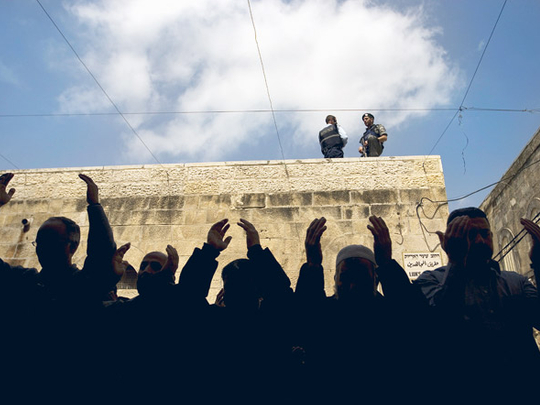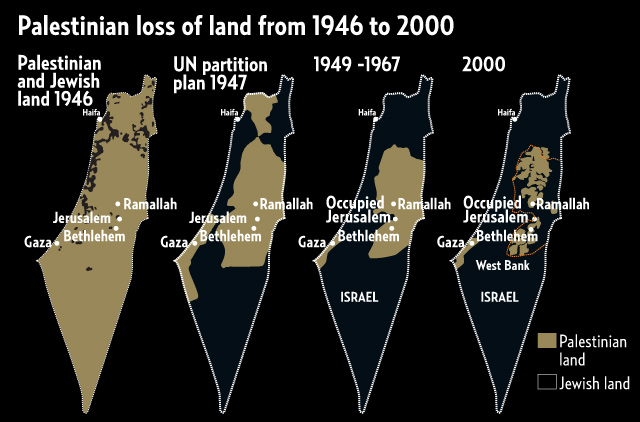
Dubai: When the day comes for Israeli and Palestinian negotiators to discuss the final borders of their "two states", they will be locking horns over the maps they will use.
The Palestinians will present maps dating back to the pre-1967 Arab-Israeli war.
The Israelis will present maps based on today's reality.
Click here to see the West Bank expulsion orders
As Israelis will show how their measures have changed the situation on the ground, the Palestinians will be surprised to see how Israel has "swallowed" the land, leaving only less than half of it open for negotiations.
A battle over the size of the Arab land left to establish the Palestinian "independent viable state" will erupt.
Today, "the Palestinians control 42 per cent of the West Bank. They own only 42 per cent of it", prominent Palestinian map expert Khalil Toufakji said.
So, "when Israel says it will hand over 96 per cent or 90 per cent of occupied Arab land, it is not clear whether it means the 100 per cent land occupied in 1967, or the less than 50 per cent left [at present]," Toufakji, head of the Mapping Department at the Arab Studies Society in occupied Jerusalem, explained to Gulf News.
The size of the West Bank which Israel occupied 43 years ago was 5,800 square kilometres. However, Israel later annexed the strategic Lattron area (58 square kilometres), and also extended its jurisdiction and control over the Dead Sea area (200 square kilometres), according to experts.
Israel also declared its side of the Jordan Valley, which constitutes nearly 33 per cent of the West Bank area, a "no-go" zone for Palestinians.
As for the 72-square-kilometre occupied East Jerusalem, Israel confiscated many Arab properties leaving Arabs to control only 13 per cent of occupied East Jerusalem at present.
However, experts believe as a result of the accelerated Israeli measures to judaise the city, the percentage under Arab control is expected to further decline.
Israeli authorities have been confiscating Palestinian property and the papers of Jerusalemites, as well as demolishing Arab homes in the East of the occupied city.
Moreover, the signed Oslo agreement between Palestinians and Israelis indirectly gave Israel, according to experts, more control over Palestinian land by dividing the land into A, B and C areas.
The "A" areas, which mainly include Palestinian cities, fall under the control of the Palestinian National Authority (PNA).
However, the "B" areas, adjacent to Palestinian cities fall under the security control of Israel but the PNA has administrative control.
As for the "C" areas, which include all rural regions, border areas with both Jordan and Israel as well as main roads in the West Bank, they fall under Israeli control.
Illegal
"I always say, there will be no Palestinian state, there will be two states in one state," said Toufakji, who was banned last month from travelling for six months by the Israeli Ministry of Interior, for undeclared "security reasons".
"There will be a state of colonies that is geographically connected. And there will be a state for Palestinian population clusters, which will be connected by tunnels [underground]".
While Palestinian officials acknowledge the fact that Israel has reinstated its security control, at least, over all the West Bank, since the second intifada which erupted in late 2000, they insist they will negotiate on all the West Bank.
"If the Israelis took Palestinian land for colonies somewhere, we don't say that piece of land is out of negotiation. No way, we will include it in the negotiations," PNA spokesman Gassan Al Khateeb said.
"We will negotiate over 100 per cent of the land occupied in 1967, and whatever changes were introduced for colonial activities or else were illegal," Al Khateeb told Gulf News.
He explained this rejection not only came from the Palestinian side, but also from the international community — including the European Union and the United States.
Both colonies and borders are among the issues left for the final status talks between the Palestinians and Israelis. The final status talks were scheduled to start many years ago, but have faced many hurdles.
The peace talks are stalled at present.
"Do you know that we were strong before 1993, and the establishment of the Palestinian [National] Authority? We were stronger than now," Toufakji said.
Explaining his view, Toufakji said the "world believes we are liberated people, and that we have presidents and prime ministers".
"But on the ground, Israel has the final say on most of the issues. It also controls the borders and has the upper hand on the borders and those who enter or leave."
"Israel will go and tell the world the Palestinians are committed on the issue of security," Toufakji said.
However, other Palestinian officials refute the view that the world doesn't know enough of the situation in the West Bank, and that the Palestinians were stronger before the establishment of the PNA.
"No, I believe the world knows much more than that," Al Khateeb said. "The world knows what is going on, maybe much more than what many people in Arab countries know."
Scores of Western countries have diplomatic representatives in the West Bank.
"They all send reports [back to their countries], and they all live with us whether in [the West Bank city of] Ramallah or in occupied Jerusalem."
While all the UN organisations have offices in the West Bank, "the small country" is considered the most visited country in the world by diplomats, fact-finding missions, and parliamentarians from around the world and receives the highest number of international journalists, Al Khateeb said.
Many experts share with Toufakji the view that if Israel today "wants anything, it will seek the PNA's assistance, which will in return implement the Israeli request".
But others expressed a different view. "The PNA acts according to its convictions of what is for the benefit of the Palestinian people," Al Khateeb said.
"For more than one year, and I am limiting the period because I have read reports during that time frame, the PNA has not objected to any form of protest, demonstration or sit-in or any form of opinion expressed," Al Khateeb continued, "on the contrary the PNA encourages people to express what we call the popular resistance."
According to public opinion surveys conducted over nearly 13 years, Al Khateeb said: "Palestinian people do not want at all to go back to the military confrontations with Israel."
Do you think a two-state solution is still possible as colonies continue to expand in the Occupied West Bank? What is the best situation the Palestinians can ask for at this point?













